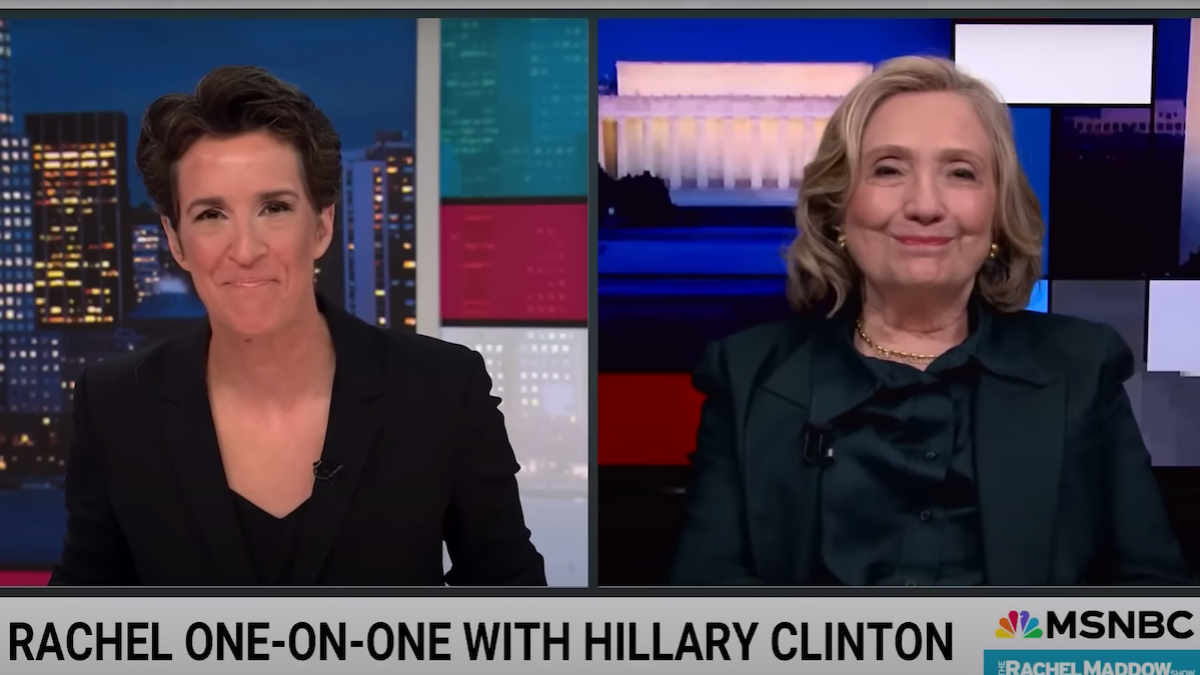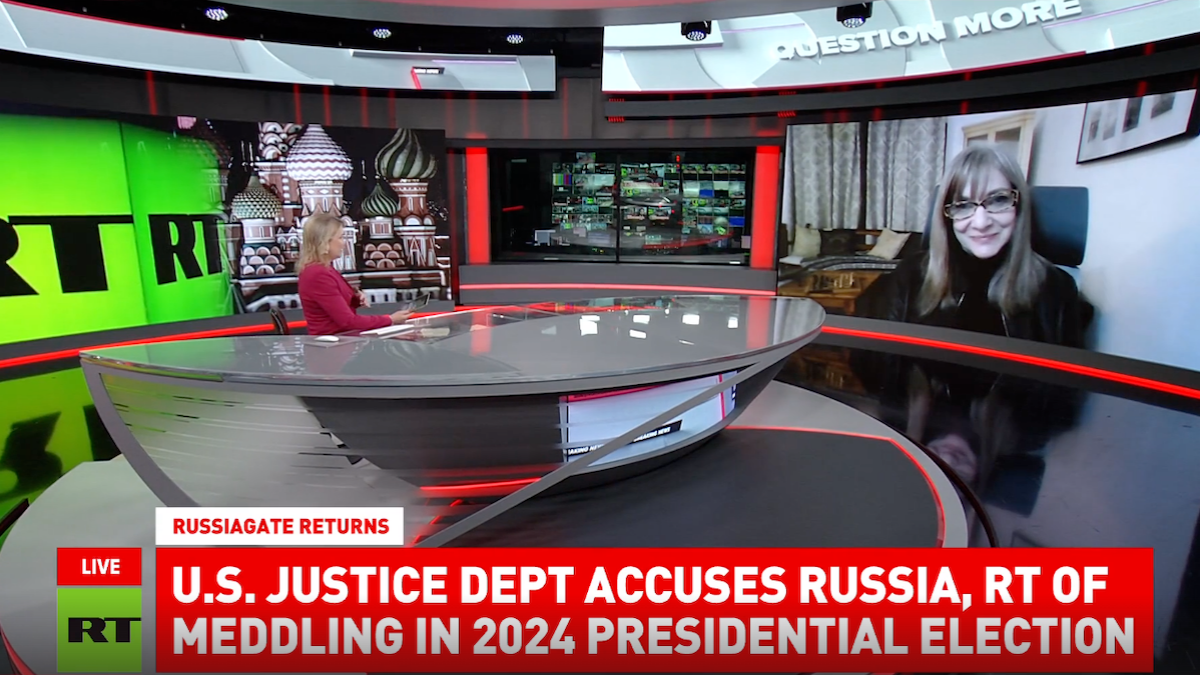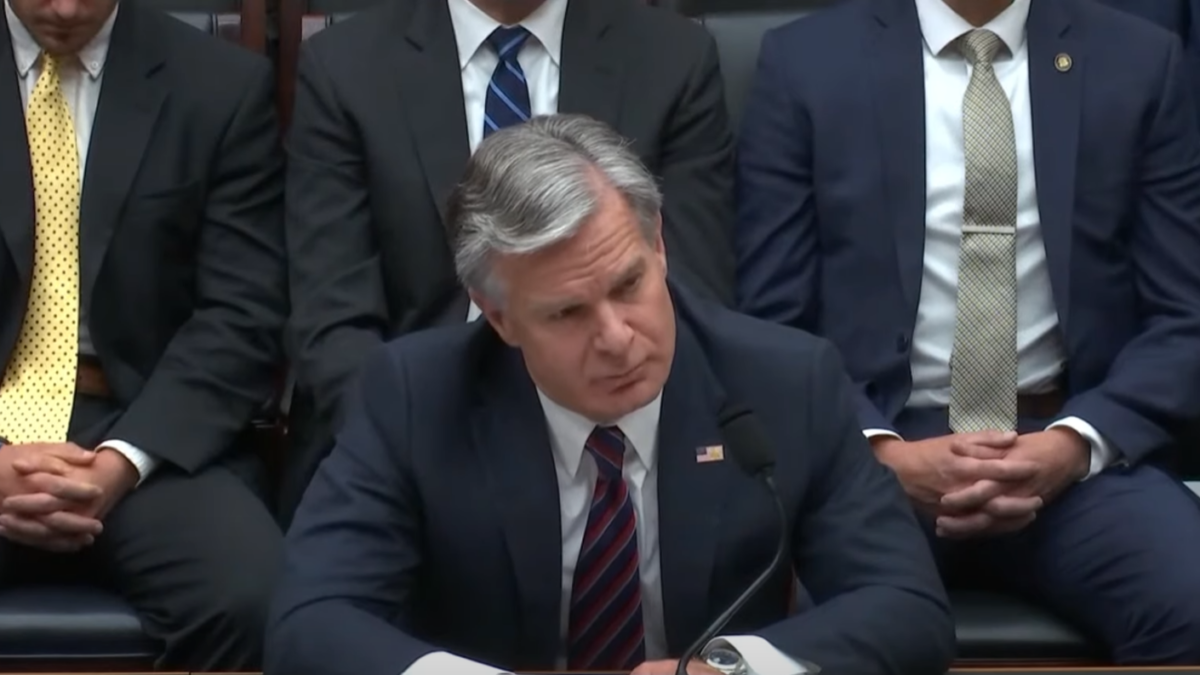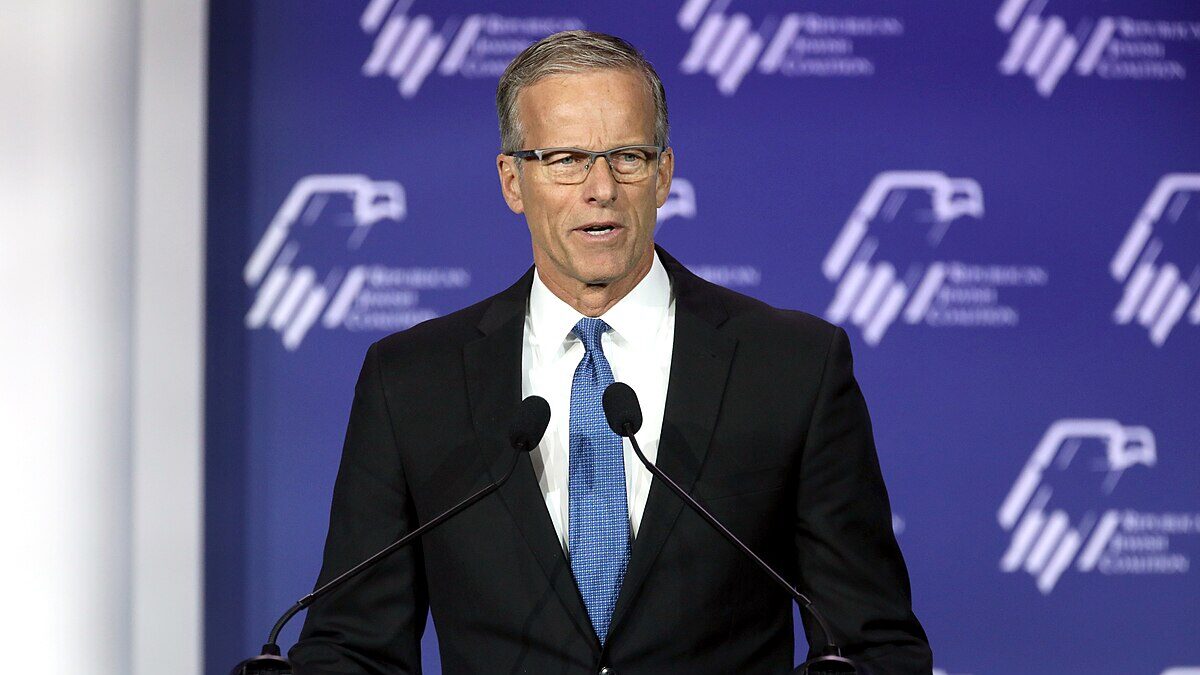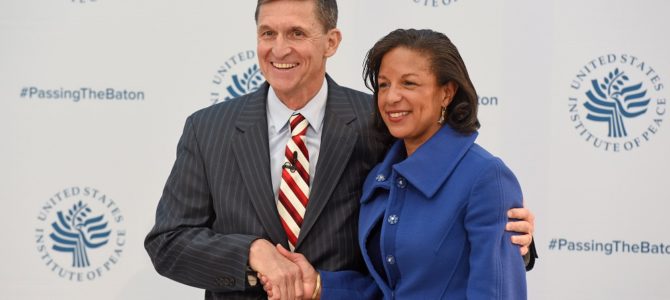
The unsealing last week of a series of documents in the Michael Flynn criminal case cemented the reality that a small cadre of high-level FBI agents set a perjury trap for President Trump’s then-national security advisor. Beyond exposing the depth of this despicable personal and political hit job on a 30-year military veteran, the newly discovered documents hold great legal significance. Here’s your legal primer.
The Russiagate special counsel’s office charged Flynn with violating 18 U. S. C. § 1001, which makes it a federal crime to “knowingly and willfully” make a false statement of “a material fact” to a federal official. Former Special Counsel Robert Mueller’s team claimed Flynn violated Section 1001 by lying to FBI agents Joe Pientka and Peter Strzok—the latter of whom has since been fired—when the duo questioned Flynn on January 24, 2017, about Flynn’s December 2016 telephone conversations with the Russian ambassador.
Flynn pleaded guilty to the Section 1001 charge in December 2017, but after the special counsel’s office disbanded, Flynn fired his prior attorneys and hired Sidney Powell. He later moved to withdraw his guilty plea, arguing his prior Covington and Burling lawyers had provided ineffective counsel. More significantly, Flynn maintained that he is innocent of the charge and had only pleaded guilty because Mueller’s prosecutors threatened to go after his son if he refused.
New Lawyer Discovers a Rat’s Nest
Since Powell took the reins of Flynn’s legal defense nearly a year ago, she has been busy reviewing the voluminous file Flynn’s former lawyers kept. In a court filing a little more than a week ago, Powell revealed she had discovered strong evidence supporting Flynn’s claim that federal prosecutors had threatened to target his son.
“We have a lawyers’ unofficial understanding that they are unlikely to charge Junior in light of the Cooperation Agreement,” one email read, referring to Flynn’s son, also named Michael Flynn. A second email proved even more damning, as Flynn’s lawyer suggested prosecutors were attempting to keep the Michael Flynn Jr. part of the deal secret to avoid having to reveal it to other defendants against whom Flynn senior might testify. (Disclosing such impeachment testimony is constitutionally mandated by the Giglio decision.)
“The government took pains not to give a promise to [defendant Flynn] regarding Michael Jr., so as to limit how much of a ‘benefit’ it would have to disclose as part of its Giglio disclosures to any defendant against whom MTF may one day testify,” Flynn’s attorney wrote in the email Powell attached to a supplemental filing in Flynn’s case.
This evidence confirms Flynn’s claim that he was coerced into the plea agreement. (It also provides an independent basis for a plea withdrawal, although outright dismissal is a more appropriate remedy to respond to the outrageous prosecutorial misconduct.) That coercion explains why Flynn would have pleaded guilty to lying when he did not knowingly misrepresent his conversation with the Russian ambassador to the FBI agents.
Now It All Starts to Make Sense
In fact, this scenario makes more sense than the “Flynn lied” script: Flynn, who had served in the Obama administration as the director of the Defense Intelligence Agency, was well-versed in intelligence and would have known that his conversation with the Russian ambassador had been recorded. Flynn would have known that the FBI either already knew or could have easily learned the content of Flynn’s conversations. Flynn also violated no law in speaking with the Russian ambassador, so there was no reason to lie about the conversation.
Evidence that has trickled out over the last two years also indicates that the FBI agents did not believe Flynn had lied to them. Nearly two years ago, Andrew McCabe, the former deputy director of the FBI, testified in an executive session of the House Permanent Select Committee on Intelligence that “the two people who interviewed [Flynn] didn’t think he was lying.”
Since then, we have learned from Inspector General Michael Horowitz’s report on Foreign Intelligence Surveillance Act (FISA) abuse that, prior to interviewing Flynn, FBI Agent Pientka had attended a briefing with then-candidate Trump and Flynn to assess Flynn’s demeanor. Pientka explained to the IG that he took “the opportunity to gain assessment and possibly have some level of familiarity with [Flynn],” such as learning “Flynn’s overall mannerisms.”
The IG report further noted that “in this instance it actually proved useful because [Pientka] was able to compare Flynn’s ‘norms’ from the briefing with Flynn’s conduct at the interview that [Pientka] conducted on January 24, 2017, in connection with the FBI’s investigation of Flynn.”
That the FBI agents who interviewed Flynn did not believe he was lying, including one agent who had previously interviewed the retired general to establish a baseline of Flynn’s demeanor and assess his “norms,” provides strong support for Flynn’s claim that he did not “knowingly and willfully” misrepresent his conversations with the Russian ambassador—the first element the government would need to establish to convict Flynn of violating Section 1001.
More Reasons Flynn Didn’t Break the Law
But the newly released documents now make clear that even if Flynn had “knowingly and willfully” misled the FBI, he still did not violate Section 1001, because his statements to the FBI were not concerning “a material fact.” As the Supreme Court has made clear, to be “material” a “statement must have ‘a natural tendency to influence, or [be] capable of influencing, the decision of the decisionmaking body to which it was addressed.’” So to be criminal, Flynn’s purported lies needed to be capable of influencing the FBI.
How could Flynn’s statements have influenced the FBI, given that the FBI knew exactly what Flynn said to the Russian ambassador before the agents interviewed him? But the law is clear that even if the government agent knows a statement is false, it can nonetheless be material because it could influence an investigation. Here is where the recently unsealed documents prove legally significant: There was no legitimate ongoing investigation of Flynn at the time of the interview!
On Thursday, we learned for the first time that in a January 4, 2017 email the FBI transmitted documentation to close the Crossfire Razor investigation into Flynn. The four-page closing document summarized the supposed basis for targeting Flynn, detailed the results of the FBI’s investigative efforts—no derogatory information—and concluded Flynn “was no longer a viable candidate as part of the larger Crossfire Hurricane umbrella case.”
A series of text messages released last week show that, 20 minutes later, Strzok desperately reached out to an unknown FBI agent telling the agent not to close out the Flynn investigation yet because the “7th floor” was now involved, meaning the upper leadership of the FBI. The exchanges noted they were trying to decide what to do with Flynn with regard to a matter that was redacted, but other texts indicated McCabe and Strzok were discussing interviewing Flynn.
Flynn’s Prosecutors Mislead the Court
Here the unsealing of Exhibit 3 completes the story. Exhibit 3 in the first of Powell’s recent supplemental filings consisted of a series of emails the FBI agents exchanged in preparation of the January 24, 2017 questioning of Flynn and handwritten notes attributed to McCabe and the now-retired assistant director of the FBI Counterintelligence Division, Bill Priestap. Those documents make clear that the FBI’s questioning of Flynn was unrelated to the Crossfire Hurricane investigation and that the FBI kept the investigation of Flynn open to provide a pretext to question him.
This evidence refutes federal prosecutor Brandon Van Grack’s argument to the court that Flynn’s purported “false statements to the FBI on January 24, 2017, were absolutely material.” “At the time of the January 24 interview, the FBI was conducting a counterintelligence investigation into whether individuals associated with the campaign of then-candidate Donald J. Trump were coordinating with the Russian government in its activities to interfere with the 2016 presidential election,” the special counsel hold-over wrote in a brief to the court in opposition to Flynn’s motion to dismiss the case against him for egregious prosecutorial misconduct.
“The defendant’s conduct and communications with Russia went to the heart of that inquiry. Actions such as the defendant’s communications with the Russian Ambassador about U.S. Sanctions could have been indicative of such coordination,” Van Grack suggested.
But as the recently unsealed documents reveal, the FBI knew of those communications and nonetheless decided to close the investigation into Flynn, concluding Flynn “was no longer a viable candidate as part of the larger Crossfire Hurricane umbrella case.” That there was an official investigation still open on Flynn had nothing to do with there being a legitimate investigative purpose for questioning Flynn.
Rather, as Strzok and Page quipped in text exchanges unsealed last week, the FBI’s failure to have expeditiously closed the Strzok investigation was the result of their “utter incompetence” which, in their minds, proved to be “serendipitiously good.”
Without a legitimate investigative purpose for questioning Flynn, his statements—legally—could not be material within the meaning of Section 1001. Or, as Powell put it more bluntly to The Federalist, “there is no world in which Flynn’s statements to the agents in the scenario of this rank setup were material to any ‘investigation.’”
It’s a Trap!
Powell is correct. This was no investigation. This was a “rank setup.” It was in essence a perjury trap, where the “government questions a witness for the primary purpose of obtaining a statement from him in order to prosecute him later for perjury.” As the case law explains, “it involves the government’s use of its investigatory powers to secure a perjury indictment on materials which are neither material nor germane to a legitimate ongoing investigation.”
Remarkably—because who puts this stuff in writing!—Priestap’s handwritten notes released last week expose this reality: “What is our goal? Truth/Admission or to get him to lie, so we can prosecute him or get him fired?” he wrote, after recognizing the interview strategy devised the previous day made no sense from an investigative standpoint.
Even then, the only investigative standpoint the FBI agents floated concerned the Logan Act, and not the Crossfire Hurricane Investigation. There was no open Logan Act investigation into Flynn, and any such investigation would have been an illegitimate—and laughable—basis on which to question Flynn.
Mark Hemingway’s concise summary of the Logan Act sharpens this point:
Let’s talk about the Logan Act for a bit. Or rather, let’s talk about why serious people don’t talk about the Logan Act. The Logan Act is to national security laws about what phrenology is to medical science. Since its passage in 1799, no one’s ever been convicted under the Logan Act, and just about every legal expert agrees it is wildly unconstitutional and runs counter to the First Amendment. George Logan, the senator whose actions motivated the passage of the law, was never even charged under it. Seriously, the only man charged under the law was a Kentucky farmer who wrote a newspaper article in 1803 about American territories allying with France—and even he was never prosecuted. The fact the Logan Act is still on the books is an accident of history, and to the extent it has been discussed in modern times, it’s almost exclusively invoked by cranks and the conspiracy-minded.
To the “cranks and conspiracy-minded” chatting up the Logan Act, we can now add coup-fermenting FBI agents. No one ever took the Logan Act theory seriously, which is why the special counsel’s office and later the rag-tag remainderman of Van Grack never mentioned it as a justification for the interview of Flynn.
It Was Always a Trap
It was always a perjury trap to oust Flynn. The details dribbled out over the last two years tell that truth: the strategizing over how to put Flynn at ease; the back-and-forth over the required timing of the 1001 admonition (a warning to a target that lying to FBI agents is a federal offense); the plotting over how to frame that warning without alerting Flynn to the real purpose of their questioning; the FBI’s decision not to show Flynn the transcript of his call with the Russian ambassador, even though, as Priestap’s notes reveal, that would be the regular course of action.
Then, following his interview, even though Strzok didn’t believe Flynn had lied, Strzok was nonetheless giddy that Flynn had misremembered the details of his conversation with the Russian ambassador. “Describe the feeling, nervousness, excitement knowing we had just heard him denying it all. Knowing we’d have to pivot into asking. Puzzle round and round about it. Talk about the funny details. Remember what I said that made Andy [McCabe] laugh and ask if he really said that,” Strzok texted his mistress, FBI lawyer Lisa Page, as he left the White House after questioning Flynn.
These facts and many others reveal that Flynn did not—and could not—have violated Section 1001, because any misstatements were immaterial.
Special Counsel and Prosecutors Violated a Court Order
Last week’s revelations hold a second legal significance: They conclusively establish the special counsel’s office, and later the federal prosecutors handling the case, violated presiding Judge Emmet Sullivan’s standing order that directed the prosecution “to produce to defendant in a timely manner . . . any evidence in its possession that is favorable to defendant and material either to defendant’s guilt or punishment.”
Under normal circumstances, the government would be required under Brady v. Maryland to produce evidence that is material to a defendant’s guilt or punishment, including, as the Supreme Court later clarified in Giglio v. United States, impeachment evidence. But in his plea agreement, Flynn waived his right to obtain any additional evidence. Judge Sullivan’s order, however, trumped that waiver and thus the prosecution was required to comply with Brady and Giglio.
Yet Powell just now received these highly material documents—and only after U.S. Attorney General William Barr assigned an independent U.S. attorney to review the Flynn case. These documents are highly relevant to the question of materiality and whether there was a legitimate purpose for the interview of Flynn, or whether it was a perjury trap.
While the answer seems clear that it was the latter, even those who refuse to acknowledge the obvious should be able to see the significance of the emails, texts, and handwritten notes: Those documents would provide a defense attorney substantial ammunition for cross-examining the government’s witnesses in order to argue to the jury that the purported lies were immaterial.
Now We Know Why Prosecutors Hid the 302s
The documents released on Thursday also revealed a further Brady violation: the prosecution’s failure to turn over the original version of the 302 interview summary. Powell has long asked for the original 302, and now we know why: They were substantially revised by Strzok and Page.
“This document pisses me off,” Page texted Strzok, in reference to the 302 form Strzok had revised and emailed Page. “You didn’t even attempt to make this cogent and readable,” Page fumed. Strzok countered, “Lisa you didn’t see it before my edits that went into what I sent you.” He then explained that he was “trying to not completely re-write the thing so as to save [Pientka’s] voice,” and yet get it to her quickly for a general review. Strzok added that he had already incorporated Page’s earlier edits.
What exactly the original 302 said before the edits is important to know. Had FBI Agent Pientka spoken of his belief that Flynn had not knowingly lied in the interview? What exactly did Pientka report Flynn had told him and Strzok about his conversations with the Russian ambassador?
We already know from Powell’s other filings that the FBI made edits to other versions of the 302s, changing the content and context of Flynn’s statements and making it appear that Flynn had lied when he had not. We now know that even more substantial edits were made earlier to the original 302. This obvious Brady material should have been turned over to Flynn’s defense team long ago.
Hopefully, U.S. Attorney Jeff Jensen will uncover the original 302 in his continued probe into the Flynn case. The public, though, will have to wait some time to learn any more details, as late last week Judge Sullivan entered an order directing Powell not to file any additional supplements on Flynn’s behalf “until the government completes its final production from the review of the United States Attorney for the Eastern District of Missouri.” Sullivan further ordered Jensen to file a notice on the public docket once it has provided Flynn the government’s final production.
There is no telling how long that will take, but in the interim, Powell should consider asking Judge Sullivan to vacate the protective order that prevents her from discussing or publishing the documents Jensen handed over. Flynn, who has been on trial in the court of public opinion for more than three years, deserves that much.
Flynn’s position in the Obama administration has been corrected.


